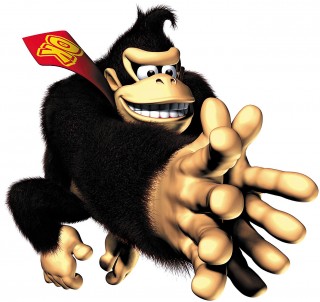By Kendall Kaut
Guest Contributor
1994 was a monumental year. For the first time in 40 years, Republicans would be the majority party in Congress. Baseball, America’s beloved past time, would see its season ended by a 232 day strike. Kurt Cobain would die but people knew they would never forget him. In 50 years, it will be an ape with a tie that will be the enduring image of 1994.
“Donkey Kong Country” is still one of the most popular games of all time. It was released for the Super Nintendo but has been re-released on the Wii, Game Boy Color and Game Boy Advance. The game stars Diddy Kong and his uncle Donkey Kong, an amiable ape we could only hope to be ruled by if the events in “Planet of the Apes” occurred. The ultimate goal of the game is to pass through more than 40 levels en route to recovering a stolen hoard of bananas.
Although “Donkey Kong Country” is quite similar to Super Mario Brothers in terms of stomping on enemies’ heads, having spare lives, and passing through levels, there are many notable differences.
In addition, Donkey and Diddy can be strategically rotated by high-fiving each other for certain situations, unlike the Mario Bros., who seem to be almost identical twins. Diddy uses quickness and wide jumping abilities to avoid the plagues of animals the evil King K. Rool uses. Donkey Kong is like Vinny from “Jersey Shore,” strong, someone you always wanted more of, but better kept in limited use.
The gameplay in “Donkey Kong Country” is exceptional. Players face levels that always have new challenges. On one level, a player has to throw exploding barrels of oil, on the next, swing from vines. New threats are constantly faced. One second a bumble bee who was cool and just staying in one zone has to be avoided; the next, a bee, as crazy as A&M going to the SEC, appears. Alligators are always ready to attack, but each experience is as terrifying as the first appearance. Players who find key crates unlock a swordfish, an ostrich and a rhino. Each time the game seems like it will become predictable, it continues to defy expectations.
Donkey Kong is also important for more than just the game. The soundtrack was widely popular and led to the popularity of future songs on later releases.
The popularization of apes in American culture reintroduced King Kong to a generation in a way better than even Denzel Washington’s iconic line in “Training Day” could. Although later games in the Donkey Kong series are as disappointing as “The Carter IV,” the original did enough good in numerous ways we should never forget it.
The events of 1994 have largely returned to normal. Baseball returned, the Republicans lost their majority and Kurt Cobain is unknown to a generation. If presented with an image of Donkey Kong, however, society still knows he’s the leader of the pack.
